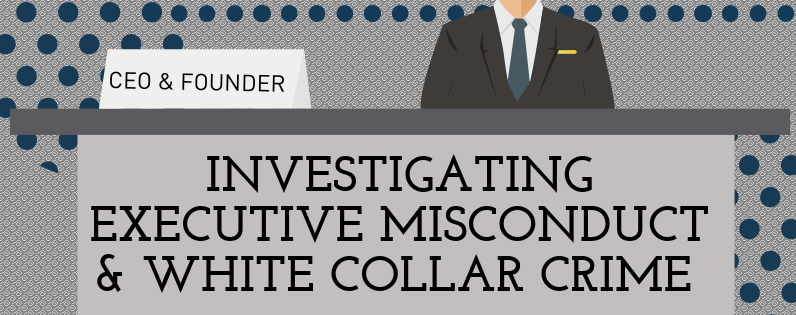5 Cyber Security Measures Every Business Needs
Cyber criminals are evolving at an alarming rate. Cyber-security product developers are on an infinite loop with felons, each trying to out fox the other with regards to data breaches. Security is absolutely necessary for brick and mortar establishments due to a myriad of reasons, but in 2019, the name of the game is cyber-security. […]
Investigating Executives & White Collar Crime

Don’t let executive misconduct ruin your corporation… When it comes to running a business, the executives who are the visionaries and decision-makers that shape a company should always remain above reproach. White collar crimes have the potential to pull a business up from the root with devastating consequences. Unfortunately, Americans know from media coverage and […]
3 Most Common Types of Corporate Crisis
[et_pb_section fb_built=”1″ admin_label=”section” _builder_version=”3.22″][et_pb_row admin_label=”row” _builder_version=”3.25″ background_size=”initial” background_position=”top_left” background_repeat=”repeat”][et_pb_column type=”4_4″ _builder_version=”3.25″ custom_padding=”|||” custom_padding__hover=”|||”][et_pb_text admin_label=”Text” _builder_version=”4.6.5″ background_size=”initial” background_position=”top_left” background_repeat=”repeat” hover_enabled=”0″ ol_item_indent=”24px” sticky_enabled=”0″] What is a corporate crisis? While exact definitions may differ, a corporate crisis is generally defined as “an event, situation, or public initiative that threatens the company’s ability to effectively operate its business. A crisis can escalate into […]
Phishers Want Your Direct-Deposit
The invention of direct-deposit payments in electronic banking have likely saved companies millions of dollars over the years in labor hours, materials, and fees that previously caused problems for companies. However, in an age where your paycheck is sent automatically to your checking account, phishers are seeking to exploit this automation for personal gain. The […]
Using a CNC to Protect Your Business
If you own your own business, you know finding the right people to build your company is vital. One “weak link in the chain,” as they say, can tear a business down to its foundation. And as such, it’s not only important to hire the right people, but also protect your business from being exploited […]
Protecting Your Business from FMLA Fraud

The Family and Medical Leave Act (FMLA) provides working families balance to their lives when their circumstances take a turn. Whether it’s caring for new life in the household—such as a newborn or a foster child—or to care for an ailing relative, the 1993 act protects employees from being terminated from their jobs when they […]
5 Ways Private Investigators Benefit Human Resources
